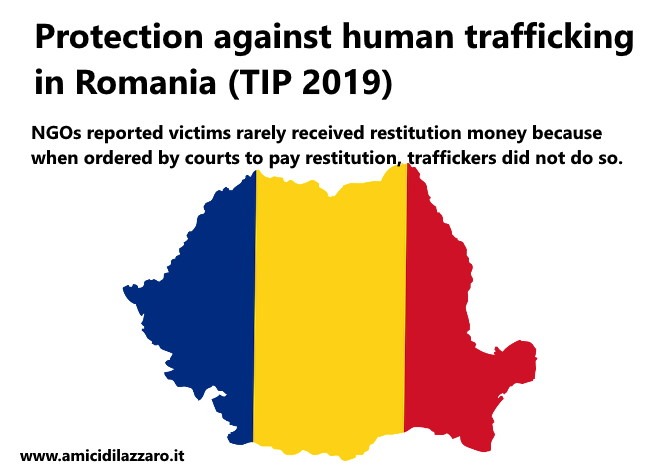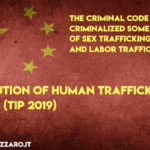
The government decreased efforts to protect victims. Public officials and NGOs identified 497 victims in 2018, the lowest number of identified victims in more than a decade. Of these victims, 73 percent were female and 67 percent were victims of sex trafficking. As in past years, fewer than half of identified victims received assistance. Authorities used the existing national victim identification and referral mechanism to identify and refer victims, and during the reporting year, with support from NGOs, the National Anti-Trafficking Agency (ANITP) drafted new procedures for implementation in 2019.
Observers reported authorities did not proactively identify victims, particularly in key places such as placement centers, and identification typically occurred after a criminal investigation started. Observers also reported authorities fined persons in prostitution, even if they were minors, without looking for trafficking indicators. Authorities referred identified victims to ANITP if the victim was an adult and child protective services if the victim was a minor. Victims received protection and assistance services in government-run facilities and in NGOrun trafficking shelters.
Perennial problems of abuse and neglect of institutionalized children and the lack of proactive identification in government facilities left children in placement centers vulnerable to trafficking. Romanian victims abroad, who accounted for 44 percent of identified victims, received free travel documents issued by Romanian embassies; however, the government did not pay for repatriation expenses, leaving NGOs and an international organization to cover the costs. In 2018, there were no foreign victims identified among refugees and asylum-seekers, but observers suspected dozens of cases. The law permitted foreign victims to request asylum and granted asylum-seekers the right to work after three months. The law also permitted foreign victims who cooperated with authorities to receive a renewable, six-month temporary residence permit.
Lack of government funding for NGO assistance and protection services continued to be problematic. While the government relied on NGOs to accommodate and assist victims, it did not allocate grants directly to NGOs due to legislation precluding direct funding. The law entitled all victims to psychological and medical care; however, the government did not provide for more than one mental health counseling session and did not finance medical care costs. NGOs paid for all psychological services costs for victims due to the government’s refusal to reimburse psychologists who assisted victims and for emergency medical care costs because the government lacked financial assistance and medical care required payment upfront.
Moreover, access to medical care required Romanian victims to return to their home districts to obtain identity documents. The process presented logistical and financial hurdles for many trafficking victims; NGOs also covered those costs. In general, victims lacked adequate support during criminal cases. In 2018, 349 victims participating in criminal proceedings accessed services available to victims assisting law enforcement; these services included transporting victims to court and returning them home. While the government provided legal aid to victims, the lawyers assigned often lacked experience working with trafficking victims. Additionally, the Ministry of Justice published the names of all trial witnesses, including minors, on its public website, putting victim-witnesses at risk of retaliation. The law entitled victims to compensation from their traffickers; however, victims generally could not afford the fees necessary to initiate civil trials or, in cases in which judges ordered restitution, to pay court officers to collect the money owed from traffickers. Additionally, NGOs reported victims rarely received restitution money because when ordered by courts to pay restitution, traffickers did not do so.
Adapted from TIP 2019 by the U.S. Department of State

